The Patent Prosecution Highway ("PPH") program continues to be a phenomenal success in Canada. It has positioned the country as a highly cost-effective jurisdiction in which to procure patent protection with exceptional speed and efficacy. According to statistics maintained by the Canadian Intellectual Property Office ("CIPO"), applications examined under the PPH have far shorter wait times for examination, receive fewer office actions and are granted at a higher rate. Accordingly, the fast tracking of patent examination under the PPH can generate significant cost savings for applicants without sacrificing patent quality.
Faster examination and higher grant rates result from applications examined under the PPH based on both national work products ("PPH Applications") and Patent Cooperation Treaty (PCT) work product ("PCT-PPH Applications"). As such, applicants have multiple options to obtain the benefits of the PPH in Canada.
Since the PPH was first adopted in Canada in 2008 as a pilot program, Smart & Biggar/Fetherstonhaugh has filed hundreds of requests for expedited examination under the PPH, achieving significant cost savings for our clients. In an internal study of PPH efficacy, Smart & Biggar/Fetherstonhaugh met or surpassed the CIPO averages for the wait time for examination, number of office actions, allowance rate with no office actions and overall grant rate.
Time from PPH request to first office action. During the period from January 2014 to June 2014, CIPO issued a first office action for a PPH Application only 1.5 months after the PPH request was made, on average. For a PCT-PPH Application, the average time to first office action was 1.7 months. The average time to issuance of a first office action for all applications, by contrast, was a much longer, 14.3 months.
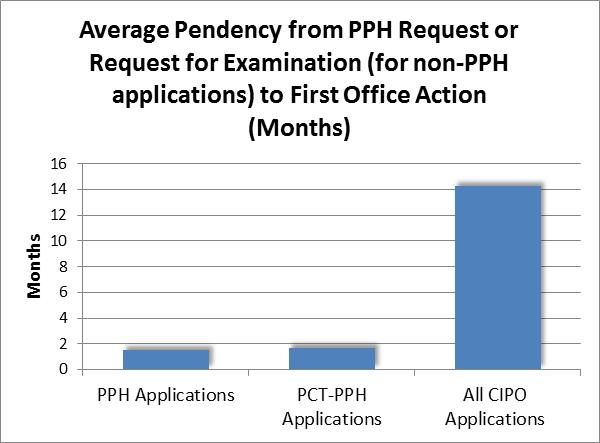
Time from PPH request to final decision. The average pendency of a PPH Application or a PCT-PPH Application from PPH request to final decision was 5.4 months or 3.6 months, respectively, which is considerably shorter than the average pendency for all CIPO applications of 32.9 months. According to the firms' internal study, Smart & Biggar/Fetherstonhaugh consistently secures for its clients final decisions from CIPO with respect to PPH-based applications in a shorter period of time than the already reduced timelines typical of the PPH. One of the firms' clients recently received an allowance only 15 days after filing a request for expedited examination under the PPH, and several other clients of the firm have received allowance of their patent applications in less than two months’ time.
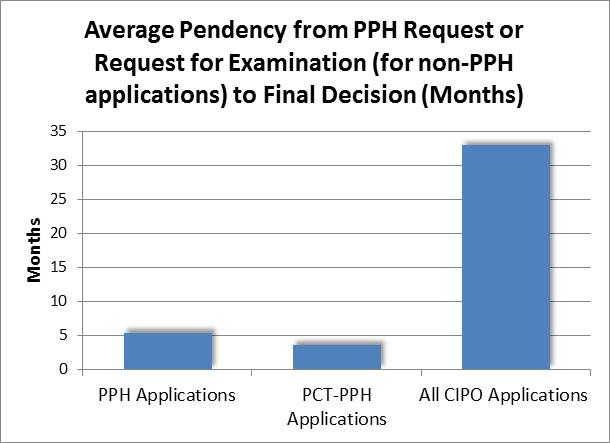
Average number of office actions. The average number of office actions for PPH Applications and PCT-PPH Applications were 0.7 and 0.5, respectively – less than half that of the 1.5 office actions typical of all CIPO applications combined.
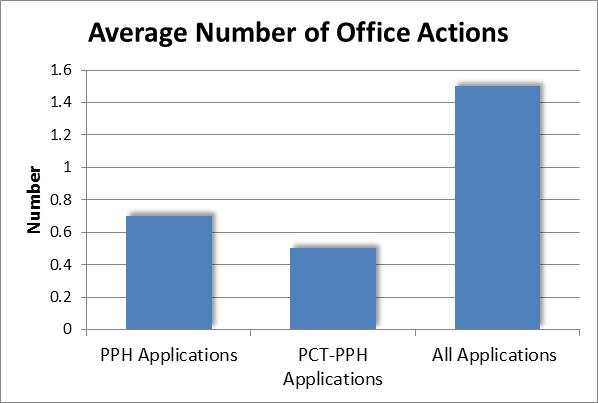
Allowance rate without office action. CIPO has recorded that, on average, 40% of PPH Applications and 43% of PCT-PPH Applications proceed to allowance without the issuance of an office action (the so-called “first action allowance”). By comparison, the average fraction of all applications that proceed directly to allowance without the issuance of an office action was only 4.4%. An incredible 52% of PPH Applications filed by Smart & Biggar/Fetherstonhaugh have proceeded to allowance without the issuance of an office action. This efficiency reduces the examination process’s time and cost to the firms' clients.
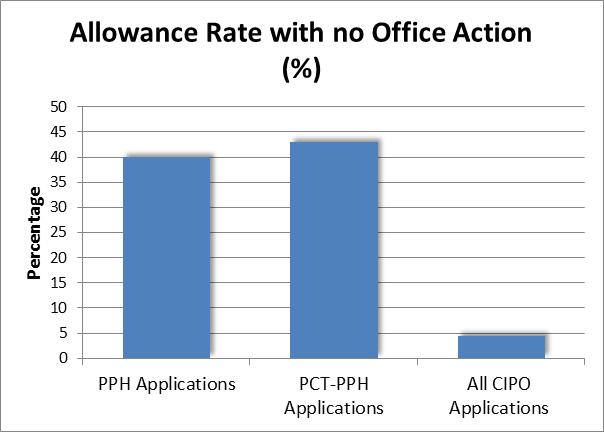
Grant rate. On average, grant rates are significantly higher for PPH Applications (91%) and PCT-PPH Applications (85%) as compared to all applications combined (65%). During the period of the internal study, the grant rate for PPH Applications filed by Smart & Biggar/Fetherstonhaugh has been a phenomenal 94%.
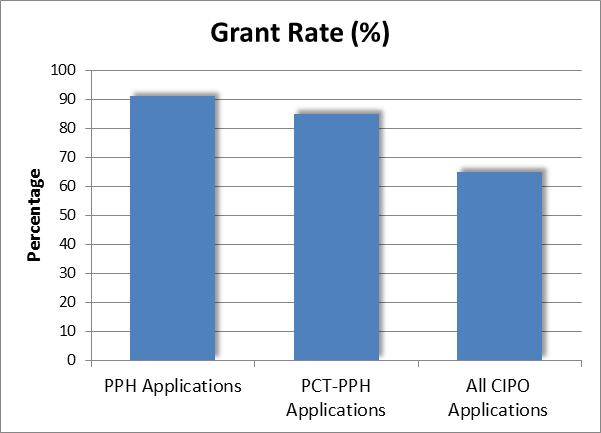
The Patent Prosecution Highway program explained. The PPH program promises a fast tracked examination process in Canada for patent applicants who have obtained an indication of allowance in an eligible country. There is no official fee to request fast-tracked examination under the PPH beyond the usual examination fee that applies to all applications. When requesting examination under the PPH, the claims of the Canadian application must be amended to correspond to claims found allowable in an eligible office of first filing or an office of earlier examination. To increase the likelihood of early allowance, Canadian formal requirements can be addressed at the time of the PPH request.
CIPO currently participates in the Global PPH pilot program. In addition to CIPO, the national offices involved in this program are IP Australia (IP Australia), the Danish Patent and Trademark Office (DKPTO), the Finnish Patent and Registration Office (PRH), the Hungarian Intellectual Property Office (HIPO), the Icelandic Patent Office (IPO), the Israel Patent Office (ILPO), the Japan Patent Office (JPO), the Korean Intellectual Property Office (KIPO), the Nordic Patent Institute (NPI), the Norwegian Industrial Property Office (NIPO), the Portuguese Institute of Industrial Property (INPI), the Russian Federal Service for Intellectual Property (ROSPATENT), the Spanish Patent and Trademark Office (SPTO), the Swedish Patent and Registration Office (PRV), the United Kingdom Intellectual Property Office (UKIPO) and the United States Patent and Trademark Office (USPTO).
Canada also has bilateral PPH agreements with the German Patent and Trade Mark Office (DPMA), the Mexican Institute of Industrial Property (IMPI) and the State Intellectual Property Office of the People's Republic of China (SIPO).
CIPO also has a PCT-PPH accelerated examination procedure using PCT work products. These work products include positive results of the written opinion of the International Searching Authority, the written opinion of the International Preliminary Examining Authority, or the international preliminary examination report issued within the framework of the PCT.
In a key development, CIPO and the European Patent Office (EPO) have announced that they have signed a Memorandum of Understanding to establish a PPH pilot program beginning January 2015. This bilateral agreement was signed at the 54th annual World Intellectual Property Office (WIPO) General Assemblies in Geneva. The pilot program will be based on both nationally filed and PCT work products. Under the program, patent applicants whose claims have been found to be patentable by either CIPO or the EPO can request accelerated processing of their corresponding applications that are pending before the other office.
This new agreement between CIPO and the EPO significantly broadens the availability of expedited prosecution under the PPH for patent applicants in Canada.
Other measures for expedited examination. Other measures for expediting examination of a Canadian patent application include the use of Special Orders for expedited examination upon payment of a government fee or in connection with patent applications relating to green technology.
Further information. Smart & Biggar/Fetherstonhaugh has extensive experience using the PPH program to achieve cost savings for patent prosecution expenses in Canada without sacrificing patent quality. To learn more about the PPH program in Canada and how Smart & Biggar/Fetherstonhaugh can help, please contact:
David Schwartz, Ottawa (deschwartz@smartbiggar.ca)
Ronald Faggetter, Toronto (rdfaggetter@smartbiggar.ca)
Stephan Georgiev, Montreal (spgeorgiev@smartbiggar.ca)
Alistair Simpson, Calgary (agsimpson@smartbiggar.ca)
The preceding is intended as a timely update on Canadian intellectual property and technology law. The content is informational only and does not constitute legal or professional advice. To obtain such advice, please communicate with our offices directly.
Related Publications & Articles
-
Canadian patent law 2025: a year in review
2025 saw a significant statutory change and the long-awaited Supreme Court of Canada hearing of an appeal regarding the patentability of methods of medical treatment. The courts also considered due ca...Read More -
Canadian IP litigation 2025: a year in review
In 2025, Canadian courts addressed a range of issues in intellectual property litigation. Highlights included the imposition of jail time on contumacious copyright pirates, appellate guidance on paten...Read More -
Canadian trademark law 2025: a year in review
2025 marked a year of adaptive reform in Canadian trademark law. Decisions, legislative updates, CIPO initiatives, and procedural enhancements collectively show the system continuing to mature in the ...Read More
